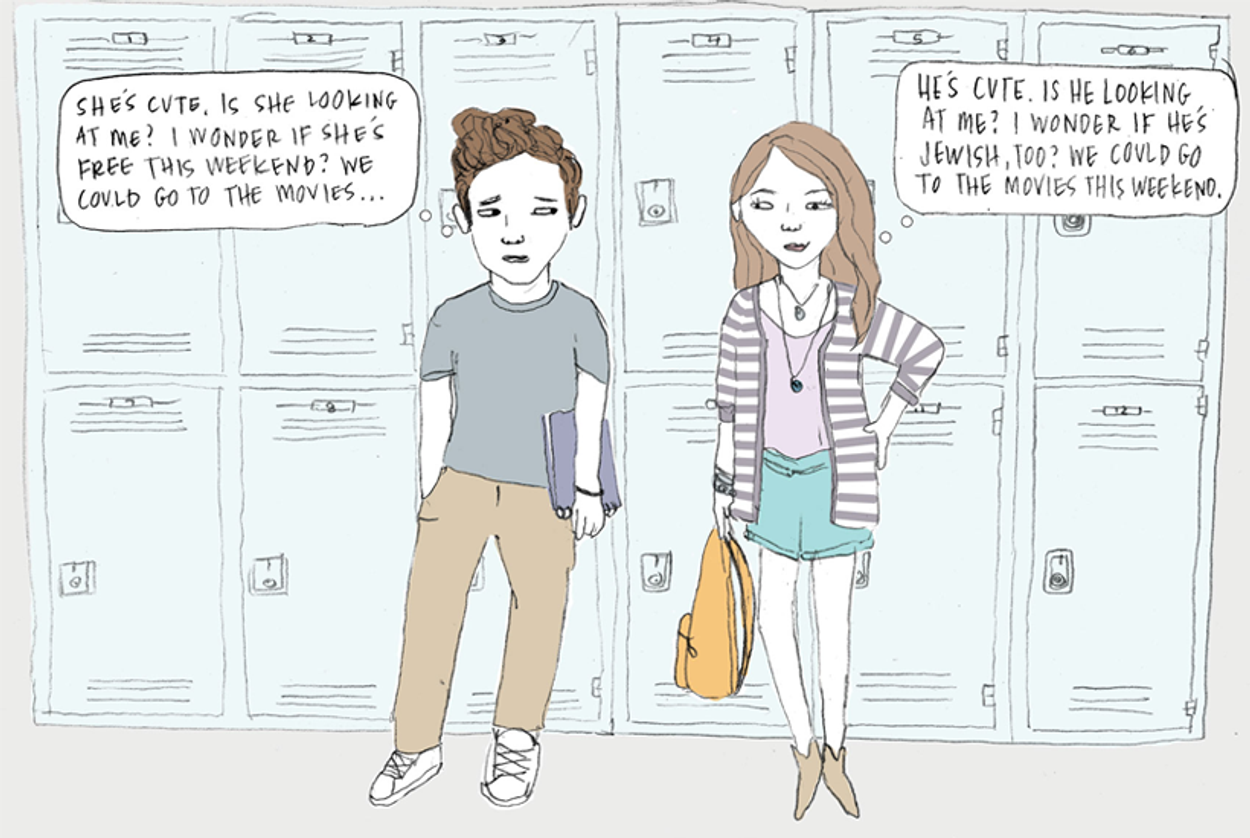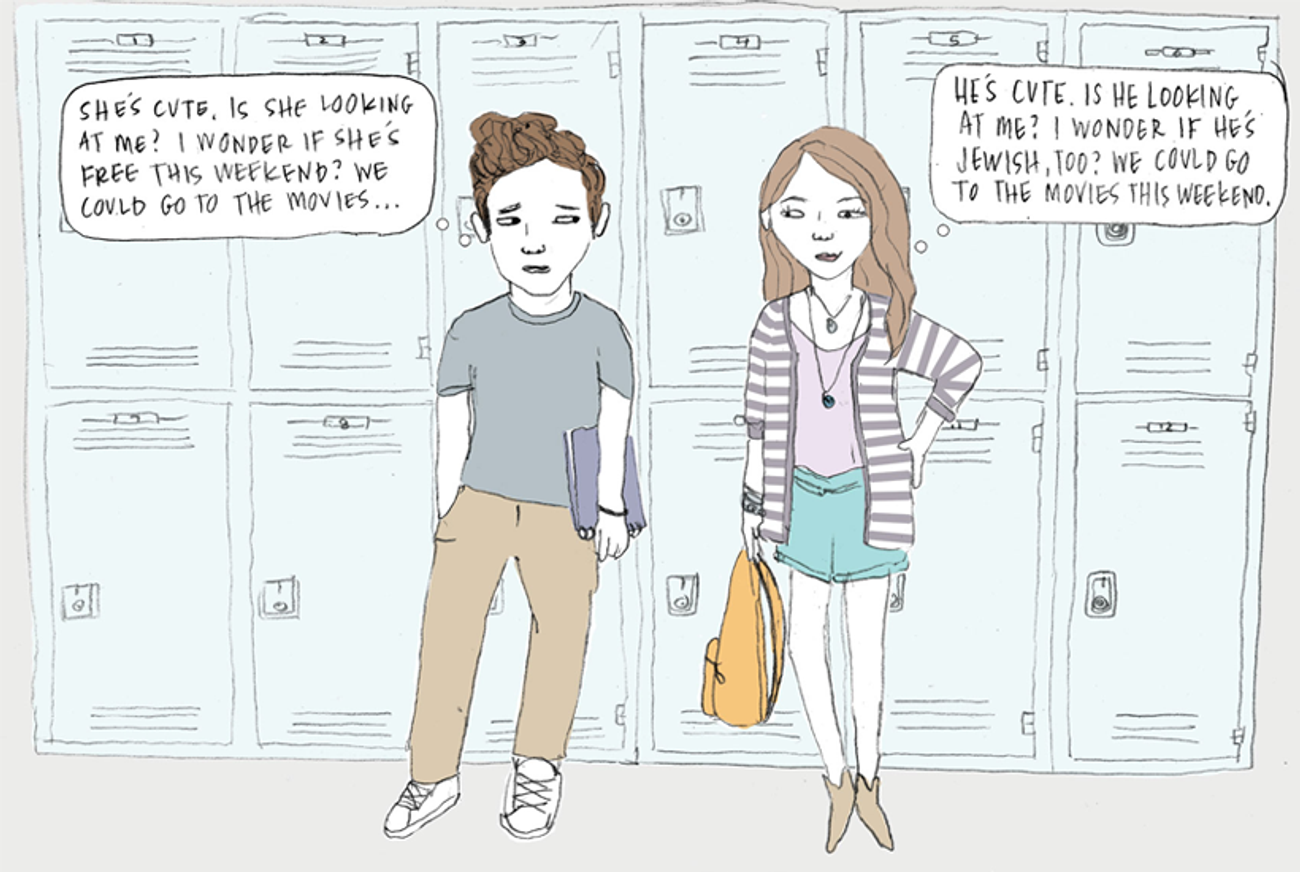Jewy Books: Including Jewish Characters Doesn’t Have To Be a Big Deal Anymore
Today’s young-adult literature is full of teenagers for whom being Jewish isn’t a Very Important Issue




When I was growing up, all the young adult novels with Jews in them were about Important Jewish Issues. The Holocaust. War. Anti-Semitism. Mental illness. Smothering Orthodox parents. Shtetls. The traumas of immigration. (The one arguably young-adult novel from my own youth with a Jewish protagonist who wasn’t traumatized by her Jewishness was Are You There God? It’s Me, Margaret. And that was banned for being anti-Christian and full of dangerous talk about sexual feelings.)
Thank God we kids of the 1980s had our Judy Blume, with her humor and openness and portrayal of regular, suburban American Jewish kids. Because otherwise our opportunities to see our lives reflected in our books were pretty limited. Today, though, YA is a humungous publishing category; even though book publishing is in shaky shape, YA is one of the few categories to show growth. It encompasses a lot of genres (realistic fiction, dystopian fantasy, sci-fi, noir, horror, suspense, graphic novel) and is often read voluntarily by actual discerning adult humans. Critics are calling this the golden age of young-adult literature. (The 1980s remain the golden age of teen movies; these days my daughter Josie tells me what to read, and I tell her what to watch.)
Today’s books with teenage Jewish characters aren’t all full of trembling and intensity and doom and self-importance. Don’t get me wrong—there are still lots of books, some of them superb, that deal with Important Jewish Issues. But there’s also an increasing number of young-adult books that might be termed Jewy rather than Jewish.
These books are set in contemporary, diverse high schools where some kids are Jewish and some aren’t. They feature Jewish characters for whom Judaism is just one aspect of identity—like red hair or a love of The Smiths—rather than the singular defining characteristic (or the primary source of conflict). Some of the Jewish characters’ friends are Jews; some aren’t. Jewish characters may even (gasp) date outside their religion. Basically, these books parallel the lives of most American Jewish teenagers today.
The New York Times Young Adult Bestseller list for this week (Sept. 7, 2014) has 15 books on it. Five of them (If I Stay, Where She Went, The Book Thief, Paper Towns, and Isla and the Happily Ever After) feature Jewish characters. (Do I have to point out that five out of 15 is a lot of books, given that we’re, what, 2 percent of the population?) Four of the five are romances, featuring a lot of humor and set in the contemporary, diverse world that most American Jewish teenagers know. The Book Thief is a Holocaust novel narrated by Death. (Uh, Spoiler alert.)
Here’s an informal roundup of some Jewy, witty, contemporary young adult novels I’ve enjoyed in recent years. Some of them feature Jews dating non-Jews. Let the hateful comments commence!
Isla and the Happily Ever After, by Stephanie Perkins, is a newly published, swoonily romantic gem—the final book in a trilogy of romances set in an international school in Paris. Josh is a passionate artist who loves graphic novels; Isla is an academic star who still isn’t sure exactly what her passion is. They’re both New Yorkers. He’s Jewish, the son of a political bigwig; she’s Catholic. Both feel connected to tradition but not aren’t quite sure how they feel about religion. (Isla calls herself a “Christmas tree agnostic” and Josh a “Yom Kippur atheist.”) Josh doesn’t believe in God, but he’s connected to Judaism and has a revelation during the Yamim Noraim; he wants to hang out with Isla even if she doesn’t like him the way he likes her. During a Parisian stroll, he tells her:
“So the period between Rosh Hashanah and Yom Kippur is for reflection. You’re supposed to think about mistakes, ask forgiveness, make resolutions. That sort of thing. And then Yom Kippur is, essentially, the deadline.”
We split apart to pass a gentleman walking a basset hound, and when we reunite, the distance between us halves. “So. Wait. You contemplated your life and … resolved to become my friend? Even though you’re no longer a practicing Jew?”
Josh gives me a wicked smile. “Is that a requirement for your friendship?”
I give him a look.
He laughs, but he follows it with a wistful shrug. “I don’t know. There’s something … poetic about the time of year. And it’s not like I’ve figured out everything spiritually or whatever, but I do think it’s still okay to make resolutions. On my own terms.”
Is it troubling that Josh is so comfortable in his American Jewishness, with a powerful and important father and his own TV appearances and enough money to attend a fancypants private school, that he can date a non-Jew without thinking twice about it? I’d argue that it’s merely an illustration of how acculturated Jews have become. Contemporary novels reflect contemporary life; I don’t think they’re the best place for didactic moral lessons about the perils of interfaith dating. Teenagers don’t do cause-and-effect all that well; warning them of future doom if they date goyim (or withholding novels in which Jews and non-Jews date) is not good parenting strategy. Talk to your kids about your values, if those values include no macking on the non-Hebrews. Do not censor their reading.
In Gayle Forman’s If I Stay and Where She Went, the heroine’s best friend Kim is very Jewish: weekly-Shabbat-dinner, no-dating-goyim Jewish. In the just-released movie version of If I Stay, alas, Kim’s religion has been left on the cutting-room floor (though actress Liana Liberaro’s deadpan line readings are in the straight-up Jewish comic tradition). In Forman’s later novels Just One Day (2013) and Just One Year (2013) and the novella Just One Night (May 2014), both main characters are Jews. I love these books, and not just because Forman is one of my best friends in the universe (so I’m not sure why I’m calling her “Forman”).
The first volume offers nice-Jewish-girl Allyson’s perspective on a whirlwind post-teen-tour summer romance with a hot Dutch boy. After the duo’s one schmoopy perfect day, Willem disappears and Allyson is devastated. She goes home, heads off to college and mopes through much of freshman year while wondering what the hell happened to Willem. Gradually, though, she starts figuring out who she is, who she wants to be, how she wants to craft an identity separate from her parents. The second book is told from Willem’s perspective. Why did he abandon Allyson in an artists’ squat in Paris? Is it because he is a manipulative playboy weasel? No. In fact, Willem spends the book trying to find Allyson (whose real name he doesn’t even know), traveling from Paris to Amsterdam to Mexico to India, and in the process, learning about himself and the kind of man and artist he wants to become.
Just One Day and Just One Year fit together like puzzle pieces; reading them back to back, you see which character was where when and how close they keep coming to meeting up again. It’s delightfully sadistic. Allyson and Willem also have parallel experiences in different countries, like their respective Passovers. (Allyson’s suburban Seder involves her mother and grandmother seething at each other; Willem’s Seder with his gruff do-gooder Israeli mother in India involves mulligatawny instead of matzoh-ball soup and a roast leg of lamb stuffed with apples and walnuts, since you can’t get good brisket in India, what with the whole cows being holy business.) In Just One Night, the follow-up novella, our characters get their happily ever after, with Willem noting that in his grandfather Bram’s expression, he knows in his kishkes that Allyson is his boo.
The godfather of contemporary Jewy YA (with his own predilection for Yiddish) is probably David Levithan, co-author (with Rachel Cohn) of 2006’s Nick and Norah’s Infinite Playlist. Norah’s not religious but still super-Jewy. The daughter of an Englewood Cliffs record-company CEO, she’s got a hot sexist alpha-jerk Israeli ex and she’s headed for a year on kibbutz rather than to Brown University in the hopes of hooking back up with Tal. Fortunately, early in the book she experiences the revelation that Tal is a massive jerk. Like Allyson, she meets the perfect guy on an epic urban whirlwind marathon date. This time, though, the city is New York and the boy isn’t Jewish. (Levithan’s 2008 Wide Awake also featured a Jewish/non-Jewish couple.) As Nick and Norah have middle-of-the-night borscht at Veselka, the East Village Ukrainian café six blocks from my apartment, Norah tells Nick (the book’s narrator):
“There’s one part of Judaism I really like. Conceptually, I mean. It’s called tikkun olam.”
“Tikkun olam,” I repeat.
“Exactly. Basically it says that the world has been broken into pieces. All this chaos, all this discord. And our job—everyone’s job—is to try to put the pieces back together. To make things whole again.”
“And you believe that?” I ask. Not as a challenge. As a genuine question.
She shrugs, then negates the shrug with the thought in her eyes. “I guess I do.”
Like Josh, Norah’s familiar with basic Jewish teachings. She doesn’t take them as literal gospel; she takes what she likes—culinarily, religiously, historically, and culturally—from Judaism and is cavalier about the rest. I imagine that if Nick and Norah ever had kids, Norah would insist that they be raised Jewish, even if she mocked herself about it and wasn’t quite sure why it was so important to her, and Nick would accede because he respects Norah’s passions and doesn’t feel strongly about religion himself. Sure, I’m probably overreading. (And I don’t think Nick and Norah get married. They’re teenagers.)
Forman has an interfaith story in the pipeline too. She, Levithan, and Perkins will all be represented in My True Love Gave to Me, a forthcoming compilation of 12 “holiday romances” from top YA authors, due in October. Forman and Levithan’s contributions are both Hanukkah stories. (Hey, two stories out of 12 is one-sixth—not as good as one-third of the YA books on the Times best-seller list, but still better than our representation in the actual population of America.) Forman’s contribution is a hilarious and spiky little interracial as well as interfaith romance involving frequent references to Ned Flanders. The book’s already received a starred review from the notoriously picky Kirkus, which said, “Rich language and careful, efficient character development make the collection an absorbing and sophisticated read, each story surprisingly fresh despite the constraints of a shared theme. It’s that rarest of short story collections: There’s not a single lump of coal.”
You know, I’m not even getting into the sheer number of young-adult novels in which the characters have Jewish names but don’t evince any sense of Jewish identity, or the ones in which a lot of the plot is actually about being Jewish. I’d like to write about the latter at some point. Or hmm, maybe it’s time for a roundup of Jewish young-adult fantasy and sci-fi novels … did I mention we’re living in a golden age of YA?
***
Like this article? Sign up for our Daily Digest to get Tablet Magazine’s new content in your inbox each morning.
Marjorie Ingall is a columnist for Tablet Magazine, and author of Mamaleh Knows Best: What Jewish Mothers Do to Raise Successful, Creative, Empathetic, Independent Children.
Marjorie Ingall is a former columnist for Tablet, the author of Mamaleh Knows Best, and a frequent contributor to the New York Times Book Review.